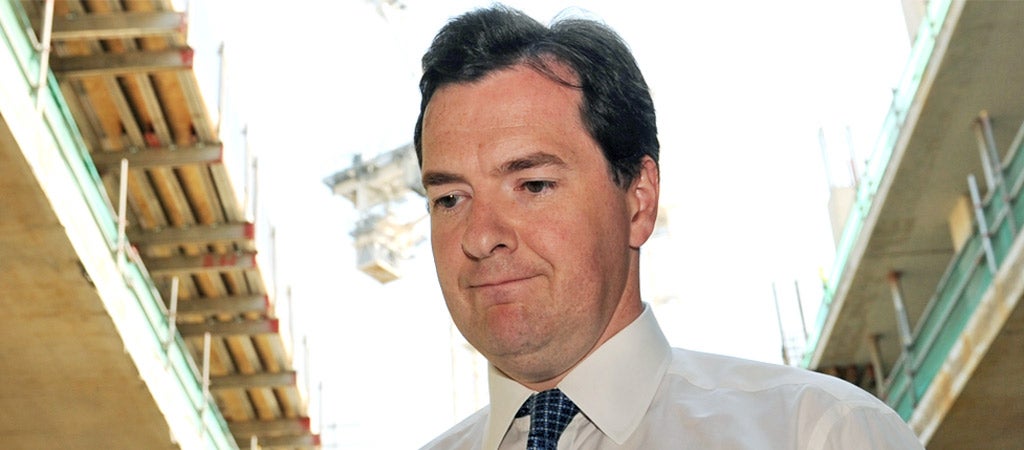'Work experience Chancellor' George Osborne urged to quit as GDP slumps

Your support helps us to tell the story
From reproductive rights to climate change to Big Tech, The Independent is on the ground when the story is developing. Whether it's investigating the financials of Elon Musk's pro-Trump PAC or producing our latest documentary, 'The A Word', which shines a light on the American women fighting for reproductive rights, we know how important it is to parse out the facts from the messaging.
At such a critical moment in US history, we need reporters on the ground. Your donation allows us to keep sending journalists to speak to both sides of the story.
The Independent is trusted by Americans across the entire political spectrum. And unlike many other quality news outlets, we choose not to lock Americans out of our reporting and analysis with paywalls. We believe quality journalism should be available to everyone, paid for by those who can afford it.
Your support makes all the difference.George Osborne was under intense pressure to change course last night after worse-than-expected official figures showed the economy shrank by 0.7 per cent between April and June.
Click HERE to view graphic
Liberal Democrats called for a "Plan A plus" to stimulate growth and one Liberal Democrat peer called for the Chancellor to be sacked. There was little attempt to disguise the Conservatives' gloom over statistics showing that gross domestic product fell for a third consecutive quarter, plunging Britain into the longest double-dip recession for more than 50 years.
Vince Cable, the Business Secretary, said: "Budget discipline is a necessary but not a sufficient condition for recovery and for rebalancing the economy. We also need policies to stimulate long-term growth." He said the Government had produced plans to inject some life into the banking system, supporting major infrastructure projects, but added: "No doubt there will have to be more."
Mr Cable declined to endorse the call by his close ally Lord Oakeshott for Mr Osborne be ousted from the Treasury. The peer told BBC Radio 4: "George Osborne has got no business experience. He has never worked outside politics. He is doing surprisingly well for a Chancellor on work experience. But really in a torrid time like this, I think we do need absolutely the best people available."
David Blanchflower, a former member of the Bank of England's Monetary Policy Committee, said: "This is the nail in the coffin of the Chancellor's credibility. The part-time Chancellor and his advisers should be put out to pasture. This is the most inept Chancellor for 50 years."
Ed Balls, the shadow Chancellor, said: "If these figures don't make the Chancellor wake up and change course, then I don't know what will. We need a Plan B now to get the economy moving again and radical reforms to set Britain on a new course for jobs, growth and long-term prosperity."
David Cameron, whose aides dismissed speculation that Mr Osborne might be moved, admitted the figures were disappointing. "They show the extent of the economic difficulties that we're grappling with, not least the situation right across the eurozone where our neighbours are also really struggling," the Prime Minister said.
Mr Osborne denied that his role as a Downing Street strategist distracted him from his main aim, insisting he had only "one job". He said: "Given what's happening in the world, we need a relentless focus on the economy and recent announcements on infrastructure and lending show that's exactly what we're doing."
Ministers hope that yesterday's statistics may be revised upwards later and take some comfort from more upbeat industry surveys and employment figures.
The surprise 0.7 per cent decline marked the biggest quarterly fall for the beleaguered UK economy since early 2009. Even allowing for the impact of the extra day's holiday for the Diamond Jubilee celebrations – which experts said would knock 0.5 per cent off GDP – the economy is still shrinking. Britain's manufacturers and builders saw their deepest slump for more than three years, with even the dominant services sector – accounting for more than three-quarters of the economy – slipping into decline as the eurozone's debt crisis sapped confidence.
John Cridland, the CBI's director-general, called the figures "very disappointing" but said official number-crunchers could be overstating Britain's economic woes. He said: "When I talk to businesses on the ground … the overwhelming view is that right now the economy is flat rather than negative, and there is potential for Britain to get back into growth later in the year."
But the figures will increase the pressure on the Bank of England to pump billions more into the economy through quantitative easing. It could also cut interest rates below the current 0.5 per cent record low. The alternative – the Chancellor easing austerity – could lead to the UK losing its gold-plated sovereign credit rating.
There is a silver lining. "The experience of the 2002 Golden Jubilee would suggest that the vast bulk of these losses will have been made up in July and, when you also factor in the Olympics effect, we should see a bumper third quarter," said Andrew Goodwin, senior economic adviser to the Ernst & Young Item Club.
Join our commenting forum
Join thought-provoking conversations, follow other Independent readers and see their replies
Comments